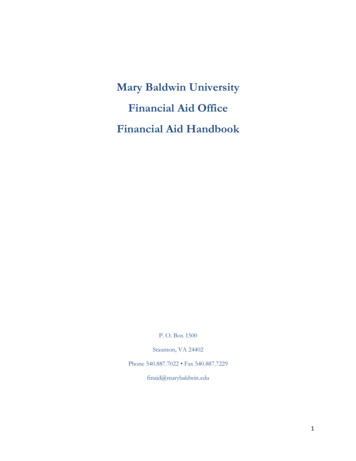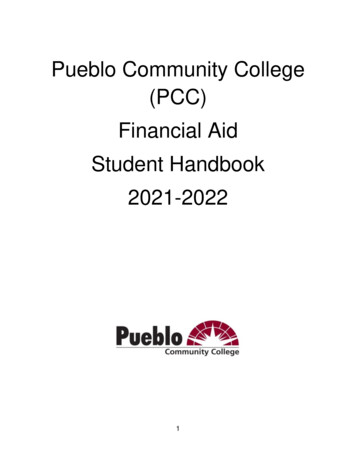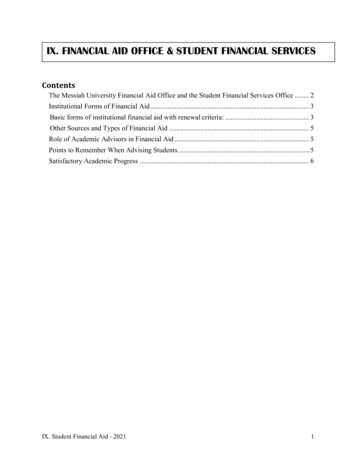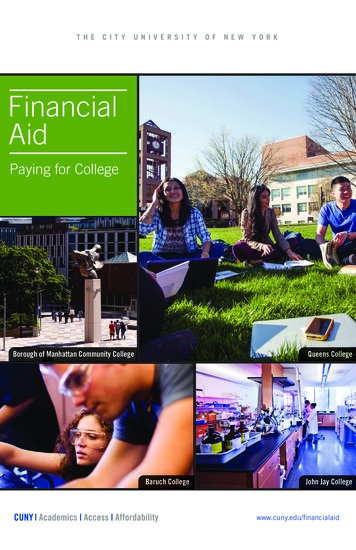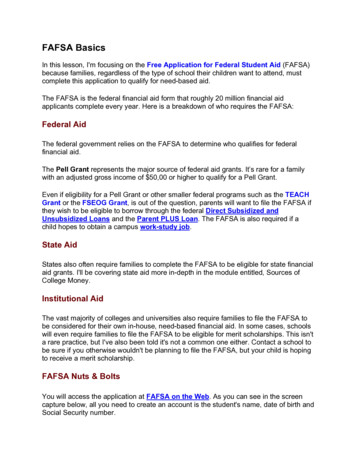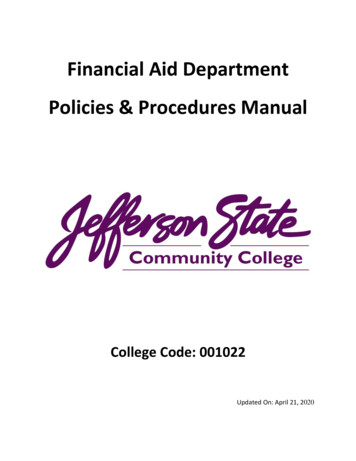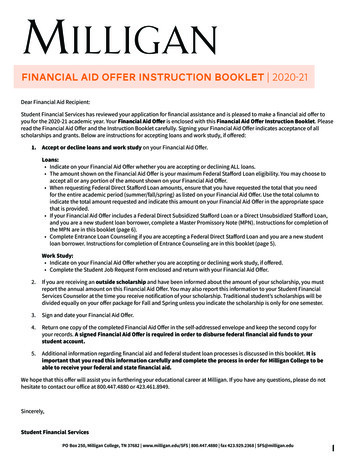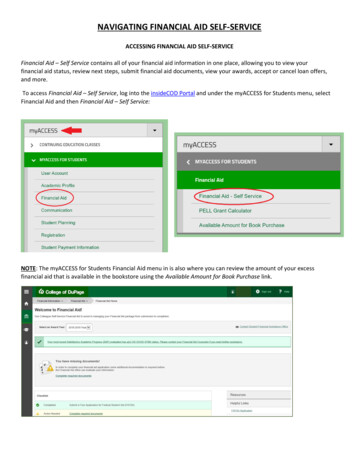
Transcription
Financial Aid DepartmentPolicies & Procedures ManualCollege Code: 001022Updated On: April 17,2019
Table of Contents1. INTRODUCTIONStatement of PurposeFinancial Aid Reference Documents2. PHILOSOPHY AND POLICIESMission of the CollegePhilosophy of Financial Aid DepartmentEqual Opportunity Statement3. INSTITUTIONAL ELIGIBILITYAccreditationIneligible ProgramsResponsibilities of Institutional OfficesGeneral Title IV Student Eligibility RequirementsAccommodations for DisabilitiesConsumer Information4. ADMINISTRATIVE CAPABILITYAdequate Checks and Balances ProceduresAdequate Staffing ProceduresFinancial Aid Department ResponsibilitiesFinancial Aid Department StructureFinancial Aid Programs in which the College ParticipatesFinancial Aid InformationFinancial Aid CounsellingCost of Attendance1
Award NotificationFiscal Records and ReconciliationRecords Management and RetentionConfidentiality of Student RecordsNotification of Rights under FERPAFiscal Operations Report and Application to Participate5. GENERAL REGULATIONSVerificationAttendance VerificationDisbursing Title IV FundsRetroactive PaymentsFraudEligibility for Retaking CourseworkWithdrawalsSatisfactory Academic Progress (SAP) PoliciesFinancial Aid WarningSuspensionFinancial Aid Appeals ProcessDeadlinesSpecial CircumstancesProfessional JudgmentDependency OverrideConflicting DataOverawardOverpayment2
1.INTRODUCTIONStatement of PurposeThe financial aid policies and procedures manual has been developed to serve as a guide forthe staff. With continuously changing in Title IV financial regulations, Jefferson StateCommunity College (the “College) must keep administration of Title IV programs incompliance with the federal regulations and keep the financial aid policy and proceduresmanual up to date. The financial aid staff is expected to administer all financial aid programswithin the regulations that govern them. In the absence of policy or procedure that addressesa given issue, the Financial Aid department is expected to follow federal guidance and useprofessional judgment based upon the intent of all financial aid programs and Officepractices.Financial Aid Reference DocumentsVarious sources for new information pertaining to financial aid regulations, laws, andDepartment of Education (ED) policy guidance are continuously used during the process offorming the manual. The Financial Aid Policies and Procedures Manual will be evaluated andupdated every year.The Financial Aid department utilizes several documents and electronic methods to keep upwith new regulations, laws, and ED policy guidance that might impact the department’spolicies and procedures. The department refers to documents and publications such as: Federal Student Aid Handbook Dear Colleague/Partner Letters EFC Formula Guide Policy Bulletins U.S. Department of Education Audit Guide Federal Registers Title IV Regulations and Updates3
2. Higher Education as Amended Electronic Announcements (IFAP Letters) Newsletters from professional associations (such as NASFAA and SASFAA)PHILOSOPHY AND POLICIESMission of the CollegeAs a member of the Alabama Community College System, Jefferson State Community Collegeserves and enhances its communities by providing affordable, accessible, quality educationaland workforce development opportunities. The College, as a comprehensive, public, twoyear, community college, exists to provide an educational environment in which the needs ofthe individual student, the community, and other target audiences can be met.The Philosophy of the Financial Aid DepartmentThe Philosophy of the College is that no student should be denied access to postsecondaryeducation because of financial barriers. While the primary responsibility of paying for Collegelies with the student and the student’s family, the Financial Aid department offers a varietyof aid, such as grants, loans, scholarships, and work study to assist as many qualified studentsas possible.The Financial Aid department is responsible for administering scholarships, grants, and loans,which are vital in supporting students to achieve their educational goals.Financial Aid offices are located in: The James B. Allen Library on the Jefferson Campus The General Studies Building on the Shelby- Hoover Campus.The operation hours are 8:00 AM – 4:30 PM, Monday through Friday.The Financial Aid department can be reached by:Phone number: Jefferson (205) 856-8511; Shelby (205) 983-52294
Fax number: (205) 856-8090E-mail: finaid@jeffersonstate.edu,Web address at: aid/The mailing address is:Financial Aid DepartmentJefferson State Community College2601 Carson RoadBirmingham, Alabama 35215Equal Opportunity StatementJefferson State has filed with the Federal Government an Assurance of Compliance with all requirementsimposed by or pursuant to Title VI of the Civil Rights Act of 1964 and the Regulations issued there under,to the end that no person in the United States shall, on the grounds of race, color or national origin, beexcluded from participation in, be denied the benefits of, or be otherwise subjected to discriminationunder any program or activity sponsored by this institution.It is also the policy of Jefferson State to be in accordance with Title IX of the Education Amendments of1972 which provides that “no person in the United States shall, on the basis of sex, be excluded fromparticipation in, be denied the benefits of, or be subjected to discrimination under any educationalprogram or activity receiving Federal financial assistance.”It is the official policy of the Alabama State Department of Postsecondary Education, includingpostsecondary institutions under the control of the Alabama State Board of Education, that no person inAlabama shall, on the grounds of race, color, disability, sex, religion, creed, national origin, or age, beexcluded from participation in, be denied the benefits of, or be subjected to discrimination under anyprogram, activity, or employment.5
3.INSTITUTIONAL ELIGIBILITY:AccreditationJefferson State Community College is an Institution of Higher Education and is accredited by theSouthern Association of Colleges & Schools (SACS) and governed by the Alabama CommunityCollege System (ACCS). Information required for verification of accreditation approval is locatedin the Office of Institutional Effectiveness and The Office of the President. The Director ofFinancial Aid is responsible for completing and submitting the Eligibility & Certification ApprovalReport (ECAR) and the Program Participation Agreement (PPA) to the Department of Education.A copy of the E-App is housed in the Financial Aid department with supporting documentsattached. Once approved, a copy will remain in the Financial Aid department and the President’soffice.Ineligible ProgramsCurrently, the College does not award Title IV aid to students enrolled in certificate onlyprograms, non-degree seeking programs, or transient students. Students must be enrolled in aneligible degree seeking program to receive Title IV funding.The Financial Aid department will review a report that has been created by the InformationTechnology department to identify students who have applied for Title IV aid and also have amajor code listed as STC or CER in admissions. Funds are removed and the students are notifiedvia their Jefferson State pipeline account of their ineligible major code. Students are also notifiedvia myJSCC Email and via FME text messaging of programs deemed ineligible for Title IV awarding.Responsibilities of Institutional OfficesThe Financial Aid department works with various offices with respect to the approval and thedisbursement of Title IV funds and the preparation and submission of reports to the Departmentof Education (ED).6
General Title IV Student Eligibility RequirementsTo be Eligible to receive Federal Student Aid, the student must: Be enrolled or accepted for enrollment as a regular student in an eligible degree orcertificate program. Be a U.S. citizen or eligible non-citizen Have a valid Social Security Number, if required Qualify to obtain a college or career school education, either by having a high schooldiploma or General Educational Development (GED) certificate, or by completing a highschool education in a homeschool setting approved under state law. Not be enrolled simultaneously in elementary or secondary school Be registered with Selective Service, for a male between the ages of 18 and 25. Meet one of the following ability-to-benefit (ATB) alternatives if enrolled prior to July 1,2012 Not be in default on a Title IV loan or, if in default, have made satisfactory repaymentarrangements Maintain satisfactory academic progress (SAP) while attending college. Have a passing score on an independently administered, ED-approved ATB test. Be enrolled at least halftime to receive assistance from the Direct Loan Program. Completed a FAFSA and the school must have a current ISIR to start the initial eligibilityprocess. Signs certifying statement on the FAFSA stating that the student: Is not in default on a federal student loan does not owe a refund on a federal grant will use federal student aid only for educational purposes Not have been convicted of an offense involving the possession or sale of illegal drugsthat occurred while the student was enrolled and receiving Title IV aid. Not have property which is subject to a judgment lien for a debt owed to the U.S. or, ifsubject to a judgment lien, have made satisfactory repayment arrangements.7
Have not obtained loan amounts that exceed annual or aggregate loan limits made underany Title IV loan program.Accommodations for DisabilitiesJefferson State Community College is committed to making its academic programs and servicesaccessible to qualified students who have disabilities. It is a goal of the College toprovide students who have disabilities equal opportunities to develop and demonstrate theiracademic skills, while maintaining the academic integrity of the College programs. Consistentwith Section 504 of the Rehabilitation Act of 1973, the Americans with Disabilities Act of 1990(ADA), and the American Disabilities Act Amendments Act of 2008 (ADAAA) it is the policy of theCollege that no qualified person with a disability shall be subjected to discrimination because ofthat disability under any program or activity conducted or sponsored by the College.Enrollment Services handles all applications for admission. Admission standards are described inthe catalog and must be met by all students, regardless of disability. Enrollment Services offers aseries of orientation sessions for entering students. Students with disabilities are encouraged tocontact the ADA Office before or during orientation. Students who need accommodations duringorientation should contact the Enrollment Services Office upon receiving registration materials.The ADA Accommodations Office is located in: Jefferson Campus: Fitzgerald Student Center, Room 300; (205) 856- 6077 Shelby- Hoover Campus: The Learning Resource Center; (205) 983-5936*Specific ADA accommodation procedures can be found in the Student Handbook section of theJefferson State Community College Catalog.Consumer InformationThe Higher Education Act of 1965 (HEA), as amended by the Higher Education Opportunity Act of2008 (HEOA), includes many disclosures and reporting requirements. A disclosure requirement8
is information that a post-secondary education institution is required to distribute or makeavailable to another party, such as students or employees. A reporting requirement isinformation submitted to the US Department of Education or other agencies.The College is required by law to make available to enrolled students, prospective students, andtheir parents’ certain information about its operations. Such information pertains to: (1) generalinstitutional operation, (2) financial aid, (3) general completion and graduation rates, and (4)annual security report.To meet the requirement, information for the College is provided below. Web site address isspecified for all information items, as well as telephone numbers and e-mail addresses of thecollege officials who can respond to questions or information requests in their specific areas. Ifrequested, the College can provide hard copies of any of the information displayed on thewebsite: r-information/As required by Section 22 of the Drug Free Schools and Communities Act of 1989 (Public Law 101226) and in recognition of this institution’s responsibility to serve as a beneficial influence on itsstudents, its employees, and the community at large, Jefferson State Community College isdesignated as a drug and alcohol-free campus and will comply with all the provisions of PublicLaw 101-226:1. The College expects its students and employees to obey all federal, state and local lawsconcerning the possession, use, distribution and sale of alcohol and illegal drugs and willconsider violation of such laws as grounds for appropriate sanctions up to and includingexpulsion of students and termination of employees when such violations occur on ourcampus or during an activity officially approved by the college.2. The College also expects its students and employees to be aware that such violations oflaw are subject to penalties including fines and imprisonment and that, when appropriate,the college will refer to the appropriate enforcement agency any employee or studentwho is in violation of such laws.9
3. The College also expects its students and employees to be aware that abuse of alcoholand illegal drugs have serious negative consequences to the health of the abuserincluding, but not limited to, cardiovascular disease, liver failure, and death.4. The College expects its students and employees to be aware that they may seekinformation about drug and alcohol abuse and may seek aid in the form of referrals toappropriate treatment programs and support groups by contacting Enrollment Services,Jefferson Campus (AL 101) or the Shelby-Hoover Campus (HSB 134).5. The College reserves the right to require employees and students who violate thestatutory laws or policies of the college concerning alcohol and drug abuse to take part attheir own expense in an appropriate counseling or treatment program as a condition ofcontinued enrollment or employment at the college. The College also reserves the rightto establish a program of early intervention in cases where employees are exhibitingbehavior normally associated with alcohol or drug abuse.6. Nothing in this policy may be construed in such a way as to deny any students oremployees their rights to due process or any other constitutional or civil protection, norshould anything in this policy be construed in such a way as to conflict with statutory law.Each of the College’s campuses and instructional sites are smoke-free. Smoking is prohibitedinside all campus buildings and in the areas immediately surrounding them. Smoking is permittedexclusively in the parking lots inside private automobiles. Appropriate containers for disposing ofsmoking materials are provided, and students and visitors are expected to use them. A citationand fine will be issued for each violation. Fines for each violation will be 8.00 and a hold will beplaced on the students’ account until the fine is paid. Violations may also be referred for a Codeof Conduct action.The College publishes an annual campus security and fire safety report of the campus communityin compliance with the Student Right-to-Know and Campus Security Act, Public Law 101-542, asamended by the Higher Education Technical Amendments Public Law 102-26 and the CampusSexual Assault Victims Bill of Rights as included in the Higher Education Amendments of 1992.This will contain crime and fire statistics for the most recently past 3 years.10
The report is to notify all prospective students, currents students, and all employees of the crimescommitted on or in the vicinity of the campus and all fires reported on campus. The report willalso provide information on the College’s policies, procedures for reporting crimes, emergencynotification, evacuations, program information and etc.Inquiries concerning the information contained in this disclosure should be directed to the Chiefof Police, Jefferson State Community College, 2601 Carson Road, Birmingham, Alabama 35215.The College is required under Section 668.46(b) of the Campus Security Act to publish anddistribute an annual security report. The required disclosure information is contained in theCatalog and Student Handbook. The Campus Crime and Security Survey as required by the UnitedStates department of Education is available at https://ope.ed.gov/campussafety/#/ .The College utilizes the e-2Campus Emergency Notification System for dissemination ofemergency information and timely warnings. Accounts can be activated after logging intoJefferson State pipeline. An emergency notification is an urgent communication regarding asignificant emergency or dangerous situation that may compromise the health and safety ofmembers of the campus community. Typically, an emergency notification is provided withoutdelay upon confirmation of an imminent or impending threat and empowers the recipient to takeappropriate action to minimize injury or loss of life.The College provides public statistical information concerning criminal offenses that occur at ourcampuses. This information can be found at the Campus Police offices.4.ADMINISTRATIVE CAPABILITYAdequate Checks and Balances ProceduresThe College administers the federal aid programs with adequate checks and balances in itssystem of internal controls. The College divides the functions of authorizing and disbursingfinancial aid funds so that no office has responsibility for both functions with respect to anystudent awarded aid. The functions associated with the authorizing of funds rests with the11
Financial Aid department. The responsibility for disbursing funds resides with the Business Officeof the College. The two functions are carried out by at least two organizationally independentindividuals who are not members of the same family or who do not together exercise substantialcontrol over the College.The Financial Aid department is responsible for: Reviewing and placing student’s awards on their accounts.Calculating all return of Title IV funds and verifying the awards per term based on theactual eligible credit hours the student is enrolled to receive financial aid.The Business Office is responsible for: Disbursing aid and mailing checks to students. Reviewing all return of Title IV calculations.Adequate Staffing ProceduresThe College is staffed at an adequate level to provide maximum service to the student populationof the College. The following offices assist in administering and ensuring compliance for Title IVprograms:Admissions Before any student can receive information from the Financial Aid department, thestudent must submit all admissions requirements (transcripts, driver’s license, SelectiveService (if required), Signature page, etc). During the registration and advising period, the Admissions Office will notify students whohave registered for courses outside of their major. Once notified through email, studentsmust speak with an advisor to verify the major and/or make possible scheduleadjustments to ensure the student is taking courses within their major.Business OfficeThe Business Office is responsible for: Disbursing financial aid checks. Establishing and implementing the College’s refund policy. Reconciling federal funds Drawing down funds.12
Assisting in completing the Fiscal Operations Report and Application to Participate(FISAP). Reviewing R2T4 calculations. Handling all third-party scholarships and state programs.Human Resources and PayrollThe Financial Aid department is responsible for verifying the Federal Work Study awardeligibility for all students. The information is then sent to the Human Resources Officerwho assigns the student to an available position and completes any additional documentsneeded for payroll purposes. Before processing, Human Resources/Payroll must ensurethe following: All work study payments must be supported by approved timesheets. Timesheets must be signed by the student and approved by the supervisor. Number of hours worked should not exceed what has been approved. The hourly rate must agree to what has been approved. Number of hours worked per day should not exceed the allowed number of hoursdeemed eligible by the Financial Aid department.Financial Aid Department Responsibilities Development of financial aid policy. Publicize the availability of financial aidAdvice students on all aspects of financial aid including, but not limited to, satisfactoryacademic progress, eligibility, appeals, rules and regulations. Communicate to students the effect of enrollment status on the financial aid award. Calculate return to title IV to determine if a student owes a repayment for an official orunofficial withdrawal Calculate refunds and repayments for financial aid students who withdraw from College. Calculate cost of attendance Submitting FISAP report. Determine student eligibility for Title IV funds.13
Track documents which applicants have placed on file. Verify application data on selected applicants. Collect progress reports for academic satisfactory progress. Reconciles program and fiscal records at least monthly. Screen and certify veterans and veterans’ dependents who apply for VeteransAdministration educational benefits. Determine student eligibility for loans and award loans based on regulations andguidelines Submit loan information to the Department of Education to originate and reconcilestudent loans Prepare deferment forms and complete student status confirmation reportsFinancial Aid Department StructureThe Financial Aid department provides trained and adequate staffing for theadministration of Title IV programs. The following diagram illustrates the organizationalstructure of the Financial Aid Department:DirectorAssociate DirectorOffice ManagerFinancial AidSpecialistFinancial AidAdvisorVeterans AffairsCoordinatorFinancial AidAnalyst/ITStudent LoanSpecialistFinancial AidSpecialistFinancial AidSpecialistFinancial AidSpecialist14
Financial Aid Programs in which the College Participatesa. Federal Pell GrantThe Federal Pell Grant is designed to help pay college-related expenses. The exact dollaraward is determined by congress. Funds are calculated each year based on a) the student’sExpected Family Contribution EFC (once processed and verified if required) and b) the numberof hours the student is registered each term for classes required for the major.The College uses the Banner system to calculate the student’s Pell Grant award byutilizing the Pell Grant chart provided by the Department of Education. Pell Grant funds areawarded for the fall and spring semesters at the beginning of the school year with the summerfunds at a later date. The maximum Pell Grant for full-time students for the 2018-2019 awardyear (July 1, 2018, to June 30, 2019) is 6,095.00.The Federal Pell Grant award is prorated when a student is enrolled in less than 12 credithours in a semester (less than full time). Depending on the amount of Pell grant eligibility, thechart below may not apply to all students. Some students attending less than full time may notbe eligible to receive a Pell grant award: 25% of award when taking less than 6 semester hours. 50% of award when taking 6-8 semester hours. 75% of award when taking 9-11 semester hours. 100% of award when taking 12 or more semester hours.The financial aid award year begins with the fall semester. May 1st is the College’spriority deadline for all students planning to enroll for fall. Although applications are processedon a rolling basis, students should be advised that each semester has a priority deadline.Students who complete the FAFSA on or before May 1st will receive priority consideration forfinancial aid funds.15
Year-Round PellSection 401(b)(8) of the Higher Education Act of 1965 (HEA), as added by section 310 of theDepartment of Education Appropriations Act, 2017 (Title III of Division H of P.L. 115-31, theConsolidated Appropriations Act, 2017), allows a student to receive Federal Pell Grant (PellGrant) funds for up to 150 percent of the student’s Pell Grant Scheduled Award for an awardyear. This provision is effective beginning with the 2017–2018 award year.b. Federal Supplemental Educational Grant (FSEOG)FSEOG is similar to the Federal Pell Grant in that it does not have to be repaid except in casesinvolving a student’s complete withdrawal. FSEOG funds are extremely limited and aredistributed to the students with the most need based on the student’s EFC number. A studentmust be eligible for a Federal Pell Grant to be considered for a FSEOG Grant. There is no separateapplication for these funds; all students who complete the FAFSA are considered and awardedFSEOG if eligible.i.Selection of Recipients1. Student must be enrolled at least half-time2. Meet SAP requirements.Selection procedures: Students who are PELL eligible and whose SARs are received by the priority deadline (May1st) may be awarded FSEOG funds for the fall and spring semesters. Students who have an EFC of zero and whose SAR is received after the priority deadline(May 1st), are awarded funds until all funds have been exhausted.ii.AwardingThe FSEOG funding allocation that the College receives is based on the information that wasprovided on the FISAP. 5% of the allocation will be drawn down from G5 for administrative costallowance with the remainder awarded to students.FSEOG funds are awarded for fall and spring as follows:16
400.00 per semester- Full-time 300.00 per semester- ¾ Time 200.00 per semester- Half-time 0 per semester- Less than Half-timeAwarding priorities for summer are determined by the first of March when emails are sent tostudents asking if they will be: Attending summer Have a zero EFC Do not have any PELL grant funds available (after Fall and Spring enrollment)FSEOG funds for Summer are determined at the end of Spring each year.c. Federal Direct LoansThe College participates in Federal Direct loans to help those students who otherwise would beunable to attend school. The College does not participate in the Parent Loan for UndergraduateStudents (PLUS) program.There are two types of Direct Loans: The Subsidized Loan provides students the opportunity to borrow funds for educationcosts at low interest rates. For students with a defined need, the federal governmentsubsidizes the interest during certain specified periods. Students who are new borrowerson or after July 1, 2013 cannot receive subsidized loans for more than 150 percent of thepublished length of the borrower’s educational program.Loans that are first disbursed on or after July 1, 2018 and prior to July 1, 2019 have a fixedinterest rate of 5.05%.Freshman students are eligible for a maximum of 3,500; Sophomore students canborrow up to 4,500.17
The Unsubsidized Loan is not awarded on the basis of need. The student will be chargedinterest from the time the loan is disbursed until it is paid in full. If the interest is allowedto accumulate and it will be added to the principal amount of the loan.Eligibility for a subsidized loan is always considered first, but if the student’s limit doesnot meet the need, an unsubsidized loan, will be considered for dependent students andindependent students.To be eligible for loan funds, students must complete the FAFSA application and apply foradmissions to the College. If applications are completed, a letter will be mailed to the studentcontaining instructions to review the financial aid terms and conditions, request a student loan,and how to view/ print any required documents. Once the student has reviewed the terms andconditions, requested the student loan, and submitted all required documents, the student willbe awarded the student loan if they are eligible.Students will be able to view their award notification and instructions to receive their funds ontheir Pipeline account under the Financial Aid tab once their award has been completed. If thestudent is receiving a loan, there are additional steps for students to complete. Students mustcomplete the Master Promissory Note (MPN), Loan Adjustment Request form (if needed), andEntrance Counseling electronically through the www.studentloans.gov.A student must be enrolled in at least 6 credit hours to be eligible for a loan. Additionally, aborrower must meet the standards of academic progress to be eligible for a loan. The standardsof academic progress are measured in three areas: completion rate, cumulative grade pointaverage, and maximum time frame. Students may go to the standards of academic progresssection for additional information. Financial aid will only pay for classes required for the studentsmajor.Freshmen who are also first-time borrowers will have to wait until 30 days into the semesterbefore the loan will be disbursed. Students are required to submit a class attendance verification(CAV) for each check disbursement.18
Students who receive subsidized and unsubsidized loans in the fall and spring may not be eligiblefor any additional loans for the summer term.i.Entrance Counseling and Promissory NoteBefore making the first disbursement of a loan to a direct loan borrower, the college must ensurethe student has completed entrance counseling and signed the Promissory Note. Entrancecounseling helps the student to understand the responsibilities regarding the loan. Students needto wait until they have received an award notification email before completing entrancecounseling, which can be completed at www.studentloans.gov. Once completed, the college willbe notified by the Department of Education. If a student has alr
Community College (the "College) must keep administration of Title IV programs in compliance with the federal regulations and keep the financial aid policy and procedures manual up to date. The financial aid staff is expected to administer all financial aid programs within the regulations that govern them.
